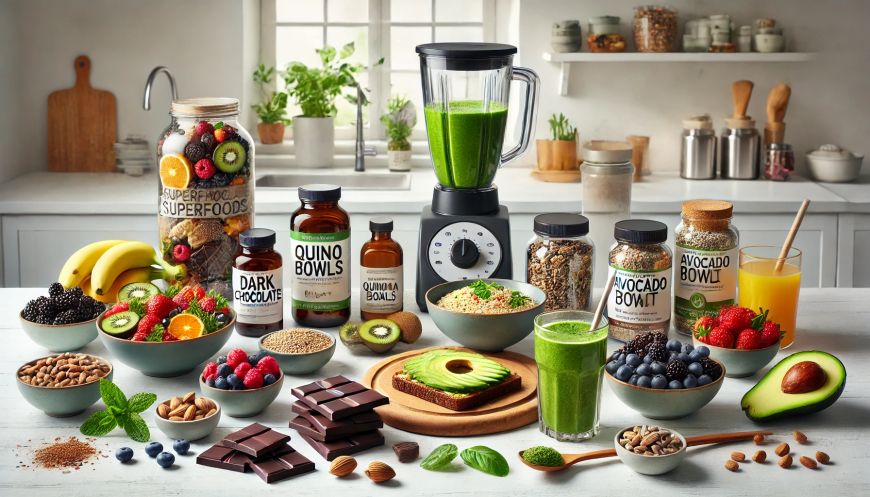Modern Foods with Myths and Misconceptions but have Insane Health Benefits
Modern foods often face myths overshadowing their health benefits. Avocados are labeled fattening, and eggs are misunderstood for cholesterol. This post busts myths, highlighting the benefits of nuts for heart health, dark chocolate for brain function, soy for hormones, and whole grains for energy. Discover the truth and embrace these superfoods for a healthier you!

1. Dark Chocolate
-
Myth: Dark chocolate is fattening and should be avoided.
-
Reality: Dark chocolate, especially with 70% cocoa or higher, is a rich source of antioxidants, improves heart health, and can boost mood when consumed in moderation.
-
Usage: Enjoy 1-2 small squares daily as a guilt-free treat or incorporate it into smoothies and healthy desserts.
2. Soy Products
-
Myth: Soy causes hormonal imbalance and is harmful to men.
-
Reality: Soy is a complete protein and contains isoflavones, which have been shown to support heart health and reduce the risk of certain cancers. Moderate consumption is safe for all genders.
-
Usage: Incorporate soy milk, tofu, and edamame into meals.
3. Eggs
-
Myth: Eggs raise cholesterol and should be avoided.
-
Reality: Eggs are a powerhouse of nutrients, including high-quality protein and essential vitamins. Studies show that dietary cholesterol from eggs has minimal impact on blood cholesterol levels for most people.
-
Usage: Enjoy boiled, scrambled, or as part of a balanced breakfast.
4. Coffee
-
Myth: Coffee is dehydrating and unhealthy.
-
Reality: Moderate coffee consumption (3-4 cups daily) is linked to numerous benefits, such as improved focus, reduced risk of neurodegenerative diseases, and a high antioxidant content. It is not significantly dehydrating.
-
Usage: Opt for black coffee or use plant-based milk to enhance flavor.
5. Gluten-Free Products
-
Myth: Gluten-free diets are healthier for everyone.
-
Reality: Gluten-free diets are essential for those with celiac disease or gluten sensitivity. For others, whole grains containing gluten provide important nutrients like fiber and B vitamins.
-
Usage: Choose gluten-free only if medically necessary; otherwise, enjoy whole grains like wheat, barley, and rye.
6. Coconut Oil
-
Myth: Coconut oil is unhealthy due to its high saturated fat content.
-
Reality: While high in saturated fat, coconut oil contains medium-chain triglycerides (MCTs) that are quickly metabolized for energy. Use it in moderation for cooking or baking.
-
Usage: Use as a substitute for butter in recipes or for light frying.
Tips for Sustainable Incorporation
-
Plan Your Meals: Create weekly menus to ensure variety and balance.
-
Stock Smartly: Keep nutrient-rich foods and supplements easily accessible.
-
Start Small: Gradually introduce new foods and products to identify what works best.
-
Consult Experts: Speak with a nutritionist or healthcare provider before starting supplements.
By integrating these foods, products, and supplements into your lifestyle, you can build a solid foundation for long-term health and wellness. Experiment with combinations that suit your tastes and needs to create a routine that’s both enjoyable and sustainable.



 Utej
Utej 





